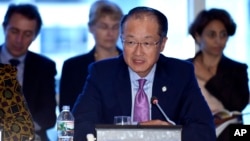A new report from the World Bank’s anti-corruption “Integrity Vice Presidency” says that while there have been advances against transnational corruption over the past year more needs to be done to fight illicit activities.
In his letter prefacing the “Integrity Vice Presidency Annual Update” for fiscal year 2014, World Bank President Dr. Jim Yong Kim said his organization is working vigorously with nations to strengthen their laws and other anti-corruption safeguards.
”World Bank Group support to country-led efforts is critical to turning the tide against corruption once and for all,” Kim said. “We will provide tools and that transform ideas into action, diffuse knowledge across the globe on what works and why, and help countries adopt successful strategies.”
'Financial safe havens'
The report said that one of the most significant hindrances to combatting corruption is the ability of lawbreakers to move money around the world quickly and opaquely.
“One major challenge is stopping the flow of the proceeds of corruption,” Kim wrote. “When money is stolen through corruption in one country, it often finds its way across borders into financial safe havens.”
The World Bank president said that stopping this involves nations acting both cooperatively and with transparency.
“When corruption hunters try to trace and recover these illicit proceeds,” Kim said, “jurisdictional hurdles and financial secrecy often stymie their efforts.”
In compiling this report, the Integrity Vice Presidency, known by the acronym INT, incorporated statements from a number of top officials and anti-corruption leaders supporting multinational action.
The Secretary-General of the Organization for Economic Cooperation and Development (OECD), Mexico’s Angel Guerria, said that the “G20” group of major nations has formed an anti-corruption working group.
“This marks the recognition that fight against corruption is a global challenge and cannot be tackled in isolation,” Guerria said.
Nigeria’s Finance Minister, Ngozi Okonjo-Lweala, is quoted in the INT report as saying, “The anti-corruption movement has taken a much more global turn since the 2008 financial crisis because many people now accept that greed and corruption were key ingredients underpinning the crisis.”
Anti-corruption efforts
The World Bank traces much of its present anti-corruption efforts to one of its former presidents, Paul Wolfensohn, who, in a speech before the bank’s 1996 annual meeting, said that a “cancer of corruption” was eating away at the integrity of nations and organizations.
In 1999, the World Bank opened its Office of Suspension and Debarment, now headed by Pascale Dubois, as a means of fighting the misuse of the millions of dollars loaned to nations for development. Debarment means being banned from World Bank-funded contracts and observers say this office has provided a strong incentive against corruption.
The 2014 INT Annual Report positions the World Bank as a “Solutions Bank” – a resource for anti-corruption initiatives. Those solutions include “addressing fraud and corruption when sanctions are not an option” and “encouraging stronger legislation in countries” along with their having “more robust regulatory bodies.”
“A legacy of violence, weak institutions, and many other challenges make it extremely difficult” to make effective progress while suppressing corruption,” the report said.
The INT report calls for compensating those who have been victimized by corruption and developing better ways to protect and support the vulnerable, including so-called whistleblowers, who uncover and report improper practices and activities.
Reacting to the report, Daniel Dudis, a policy analysts for the corruption watchdog Transparency International in Washington, said: “Corruption thrives where governance and the rule of law are weak, and we are therefore very hopeful that the Bank’s creation of a global governance practice will translate into increased Bank resources being devoted to improving governance and the rule of law in borrower countries.”





